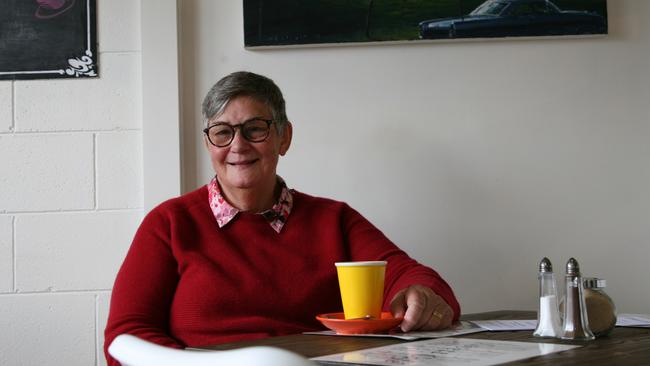Cafe Society: A capacity for advocacy drives the Cygnet Community Hub’s Mez Newman
When governments refused to listen, a community champion and her trusty team in a small Tassie town decided to tackle housing and a host of other issues their own way

Tasmania
Don't miss out on the headlines from Tasmania. Followed categories will be added to My News.
IMAGINE if people were helped into homes as soon as they needed them. It’s an unlikely outcome this winter for thousands of Tasmanians enduring various forms of housing insecurity and homelessness.
While our housing affordability crisis grows in line with manifestly inadequate social housing, in Finland the number of long-term homeless people has dropped by 35 per cent in a decade thanks to a policy initiative called Housing First.
Apartment by apartment block around Helsinki, the government is replacing a widespread “staircase” response that moves needy people through stages of temporary crisis accommodation towards secure tenancies with a different approach.
The Housing First policy recognises secure housing as a basic need, and the provision of it as the best first step in helping struggling individuals and families get their lives back on track.
It’s this sort of initiative that lights Cygnet community champion Mez Newman’s fire.
MORE CAFE SOCIETY:
KATRENA STEPHENSON: COUNCILLORS’ CONFLICTING DEMANDS
PAUL BLACKLOW: IT’S TIME TO SPLASH THE CASH
CLIVE TILSLEY: KEEP IT LOCAL IS SECRET OF SUCCESS
SIMON WELLS: TAKE ADVANTAGE OF THE GOOD OIL
ADRIAN KELLY: THE HOUSING DEBT WE DON’T NEED
Just over two years ago, Mez co-founded the Cygnet Community Hub in the Huon Valley town with her partner Kate Warren.
Sick of waiting for a government response to what they saw as urgent community need to a host of issues, the women launched a notably small but highly functional drop-in centre.
The community take-up has been overwhelming, says Mez, when we meet at Lovett Cafe a little further down from Hub HQ on Mary St, the town’s main street.
“Our couch is a hot couch,” says the former psychiatric nurse and Alzheimers Australia national director, whose community advocacy began decades ago in gay and lesbian support services.
Last year, Mez, Kate and a team of other volunteers put 6000 hours into operating the centre. Most help requests are connected with housing, employment, health, and/or diversity and inclusion. At its most basic, the response may be a gifted coat from its Warm as Toast rack, food for a fortnight, a lift to town or help booking a medical appointment.
Filling in forms is a biggie, with many people lacking the written literacy skills to do so unaided. The hub also hosts the 26Ten adult literacy program. And that’s just a small part of what it does daily.
“We are acting like the centre of the wheel, the hub, and we take that model seriously,” says Mez.
She sees the tight little operation as a pilot project for a rollout in other rural towns, viewing it as a viable alternative to the established Neighbourhood Houses program, with the latter’s typically expensive set-up costs. People in Cygnet had been calling for a community house for a long time, she says.
“People needed somewhere to come and talk to somebody, and be supported and directed to health and employment services and other opportun-ities. But we were unsuccessful in trying to get dialogue on the table with government.”
Two years before the centre opened, the gay support group Mez leads as president, Pflag, was approached by Relationships Australia to develop a whole-of-community action plan for suicide prevention, after tragic deaths in the town.
“And out of that plan, one of several important recommendations was the need for a community house,” says Mez. “We realised it would be a battle to convince some politicians of the need, but we realised we couldn’t wait three to five years for this house. We had to do something immediately.”
The Hub, which also provides a tourism information service, operates on grant funding and donations. And it runs on the smell of an oily rag out of a few rooms in the town hall.
“We have demonstrated a substantial need and our ability to build community capacity,” she says, foreshadowing a push for better recognition and more public funding.
At first glance, weekly activities resemble standard adult education evening classes — for drawing, meditation, ukulele playing, mah-jong, etc — but their ostensible purpose is only part of the story.
“Drawing class started with two people and a teacher almost on day one and now has 16-20 people on Monday nights,” says Mez “What’s happening is they have built themselves into a support community through that activity. That’s tremendous capacity-building.”
Mez is at the coalface of need in a community whose socioeconomic struggles sometimes get lost amid a tree-changer narrative. And that’s why she joins a chorus demanding urgent government action to find shelter for every Tasmanian out in the cold. Now. Today. Tonight. We may not be Finland, but our society is well able to house all its people, she says.
Mez is also calling on the State Government to reinstate Hobart’s Common Ground housing initiative as conceived, with on-site, round-the-clock support services wound back in recent years.
“There was recognition in that model that there are people in society who need more support than you or I might need, and that the best way to get it is to take it to them. Common Ground functioned like a hub, too. And they took it away.”
If this story raises concerns for you, crisis support is available by phoning Lifelife 13 11 14


